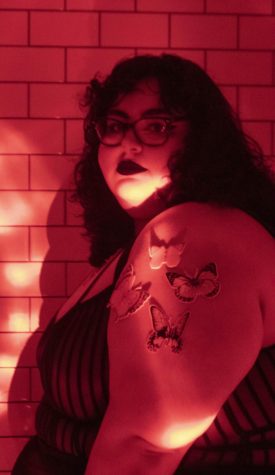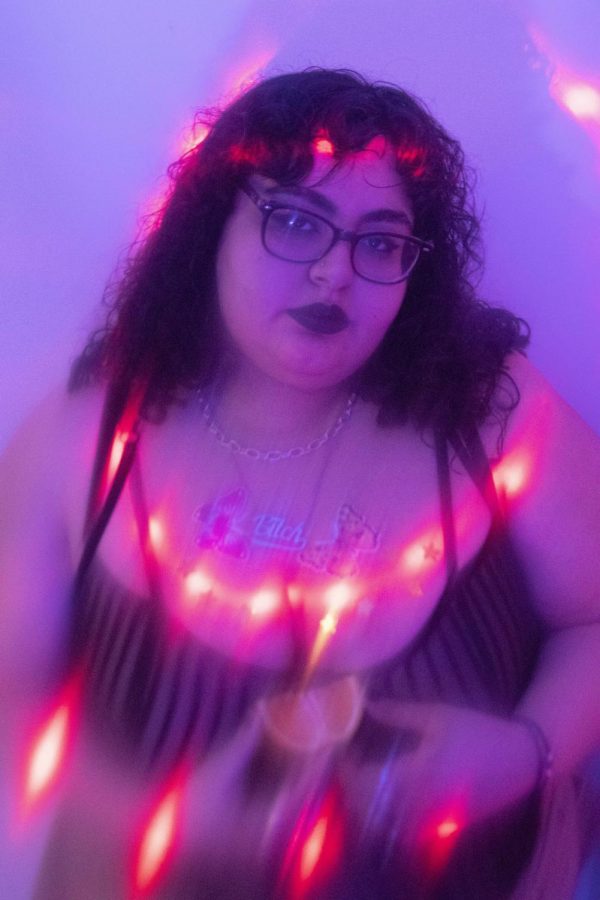Victoria Abraham on fat liberation and authenticity
College of Arts and Sciences senior educates by simply existing online as a fat person.
Shirene Anand: “Victoria’s comfort in this shoot was what made this such a success. The props — stickers and a tangerine — helped hone the entire shoot and highlight theme as well.” (Photo by Shirene Anand)
December 10, 2021
Victoria Abraham seems like a typical NYU senior, working toward finishing her public policy degree and thinking about what she might do after graduation. With her down-to-earth and raw personality, Abraham doesn’t give off the impression that she’s famous on social media. But they are speaking their mind to over a hundred thousand followers: 121,000 on Instagram, 84,600 on TikTok and 9,000 on Twitter.
Abraham goes by @fatfabfeminist on all of their social media accounts, using their platform to advocate for fat liberation, raise awareness of fatphobia and promote other social activist causes. Most of the content on Abraham’s social media talks about her personal experience as a fat person and aims to educate others on fatphobia.
They started educating others through social media in 2016, and over the course of four years they amassed 26,700 Instagram followers. But their following really took off during the pandemic when they gained about 50,000 followers in the span of six months. It was also around that time when Abraham started making their own content on TikTok. This allowed them to become a very visible figure, to the point of going viral and their page doubling in size. Yet even with a large platform, Abraham doesn’t like to call themself an influencer.

“I don’t know if that’s what I am,” Abraham said. “I just am a person on the Internet … I’m not anything special. I just am hyper visible online. But my experiences are not unique. I’m not specifically interesting, I just talk about the things that I go through.”
Abraham is an activist for fat liberation, which for her means “working to collectively get rid of systemic fatphobia.” While Abraham promotes confidence in one’s own body, they don’t call themself “body positive.” To them, it’s more important to be focused on fat liberation than body positivity.

“It’s one thing like how you feel about yourself, but ultimately, you can’t self-love your way out of being marginalized,” Abraham said. “If you’re a fat person, you exist in a marginalized body, so my goal is that other fat people don’t have to deal with the harassment that most people experience being fat.”
On social media, Abraham educates their followers on how systemic fatphobia permeates the everyday lives of fat people.
“One thing I talk about a lot is medical fatphobia, which is a very prevalent issue,” Abraham said. “Anybody who is fat has experienced some kind of prejudice or discrimination for their bodies, especially at the doctor’s and, being fat, you get a worse quality of medical care than your thin counterparts. And it’s not just that — fat people are paid less, are less likely to get hired for jobs or get callbacks. It’s legal to discriminate against fat people in 49 states.”
Hailing from Florida, Abraham grew up constantly surrounded by people who thought differently than she did, had opposing values and rarely understood her. Social media became an outlet for Abraham to express their thoughts and share their experiences to followers who care about what they have to say.
“I was able to find people that … I can have an actual conversation with, instead of fighting to prove that my existence is worthy of being talked about,” Abraham said.
Abraham aims to simply be a visibly existing fat person on social media. She didn’t have any representation growing up and desperately needed to see positive experiences of fat people, something that was rare at the time. Whatever their page might transition into over time, Abraham believes that being themself on social media is enough.
“A lot of influencers only show the highlights, and I don’t like doing that,” Abraham said. “I’ve been going through a rough time, and I have more than enough pictures to post and pretend like that’s not the case. But I think it’s important to just show fat people as full three-dimensional human beings, with good, bad and all the in-between.”
One of Abraham’s main goals with their account is to be the person they needed when they were younger — an honest, authentic, transparent and visible fat person.

”Victoria isn’t in it to be famous,” Jake Schneebaum, one of Abraham’s close friends, said. “Victoria wants to have an impact and something that she says all the time is she wants to be the person that her 12-year-old self would have needed. And when I’m watching Victoria’s videos, I feel like that is the person I’m seeing. It’s not someone who’s doing this, for fame or whatever … and I’m so proud of Victoria.”
Just being an honest and visible person online also helps Abraham in their goal to educate others on fatphobia. According to them, fatphobia stems from not having fat friends or knowing fat people. If you aren’t surrounded by anyone who experiences what fat people experience, then you might not be aware of what that’s like. Because of this, Abraham uses their page to address issues that impact fat people, ranging from medical fatphobia to confidence to societal beauty standards.
“One of the reasons why fatphobia is so pervasive is because people don’t notice it when it happens,” Abraham said. “If I don’t point out why there’s an issue with fatphobia … and how it subtly exists in our society … people aren’t going to know. So my goal is just to share these experiences with people so that they can be kinder to themselves and to others. And I think eventually, if enough people are aware of this issue, then it’ll be easier to talk about it or people will listen to fat people more when we talk about it.”
In the future, Abraham hopes to connect her public policy major with what she does online. She currently focuses on fat discrimination, and in the future hopes to work on making weight a nationally protected class under the Civil Rights Act alongside race, gender, ethnicity, religion and more. While they’re graduating in the spring, Abraham doesn’t see themself giving up social media any time soon.
“[Social media] is a great way for me to be able to connect with people,” Abraham said. “I’m very lucky, privileged and happy that I get to experience this. Even if I do get a couple of hate comments here and there. It’s worth it.”
Contact Lorraine Olaya at [email protected].




























































































































































